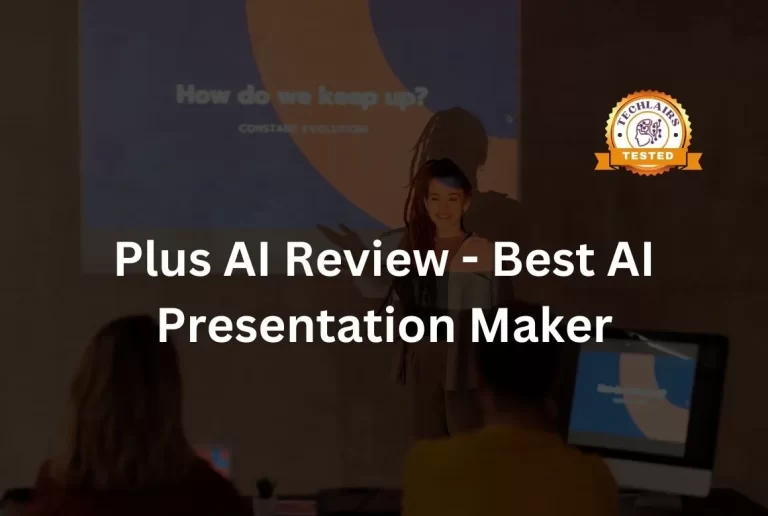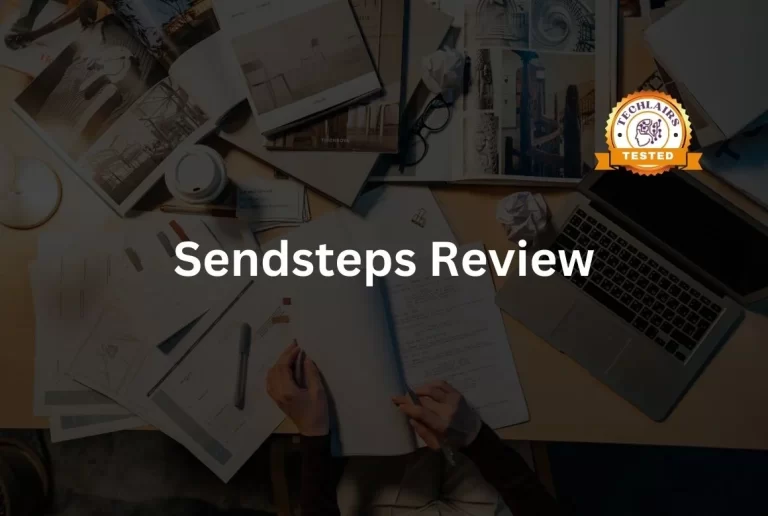5 Best AI Tools for Keyword Research (2024)
Companies around the world spend an average of 15 hours a week finding the perfect keywords.
That’s almost two full working days. 😓
But with AI, keyword research is becoming faster and more efficient.
With the right AI tools, you can take your keyword strategy to the next level and ensure that your content is not only seen but also placed precisely where it should be.
But how do you find the best tools available? 🤔
Don’t worry. We at Techlairs have done the legwork for you.
We’ve scoured the internet to find the best AI tools for keyword research for your next article.
Let’s get right into it. 🚀
Best AI Tools for Keyword Research
1. ScaleSleek

ScaleSleek is an excellent tool for SEO. It helps you find the right words for your posts and gives detailed reports on your content.
ScaleSleek is an all-in-one SEO tool that improves the quality of visitors to your website.
This tool finds the best words for your articles and can help you write and improve them to make them more visible in search engines.
Unlike other tools that ask you for keywords before writing, ScaleSleek works differently. 🔄
It suggests keywords after you have written your article.
This way, the suggested keywords are more relevant and comply with Google’s rules.
After you share the link to your article, ScaleSleek gives you a report. 📊
This report shows you many keywords that match your content.
It doesn’t show the difficulty or how competitive these keywords are, but it links to Ubersuggest and Google for more details.
The link to Ubersuggest means you need a premium subscription there to see the full keyword report.
ScaleSleek makes creating a report for your articles easy, and you only pay for what you use. 💳
Just buy credits, and you can create reports for your articles.
Pros and Cons of Using ScaleSleek for Keyword Research
Pros
Cons
2. Twinword

Twinword makes it easy to find keywords worldwide. It helps you understand keywords, groups them smartly, and suggests titles in more than 46 languages.
Twinword offers you a complete keyword research experience.
The tool provides a list of keywords and deeply uncovers popular topics, SEO metrics, and information about the paid competition. 📊
With the keyword and title scores, you can see how much influence your chosen keywords might have.
The AI tool also groups your keywords automatically.
This grouping is based on user intent, topics, and patterns and gives you a clear overview of the underlying context. 📋
By considering details such as search volume, organic competition, paid competition and CPC, you can select keywords that will increase the growth of your blog posts.
You can also refine your list with filters based on factors such as relevance score, competition, and CPC.
If you want to reach a global audience, Twinwords supports 46 languages and over 230 locations. 🌍
The tool not only helps you search for keywords but can also suggest titles based on those keywords.
But keep in mind that Twinword is a paid tool and does not offer a free trial.
Pros and Cons of Using Twinword for Keyword Research
Pros
Cons
3. Bramework

Bramework combines the power of SEMrush with AI and simplifies keyword research and content creation for optimal SEO results.
Bramework is an AI writing assistant that seamlessly integrates with SEMrush and provides a wealth of keyword data.
This makes it easier for you to find, save, and understand keywords. 🧐
The keyword data contains information about how often a keyword is searched for and how difficult it might be to rank for it.
It also tells you how many other articles use the same keyword and what results you can expect online. 📰
The AI tool can even help you find keywords that are popular at certain times of the year.
This way, you can publish articles when people are most interested in them.
But remember, you need a SEMrush subscription for all the details.
It also doesn’t offer real-time semantic keyword suggestions. 🚫
You can also use Bramework to write blog outlines and create search engine-friendly content.
And if you want to include specific keywords in your text, Bramework can help you with it.
Bramework is a paid tool with two pricing options.💲
However, you can test the tool free of charge for 7 days.
Pros and Cons of Using Bramework for Keyword Research
Pros
Cons
4. SuperChat

SuperChat streamlines your content creation with custom keyword suggestions and templates that ensure your articles are engaging and SEO-friendly.
With SuperChat, you can create high-quality content integrated with the right keywords.
It helps you discover highly searched keywords and allows you to create content that is worth reading and engaging. 📈
You can choose from over 100 content templates, making it easy to write articles.
SuperChat AI makes keyword research super easy.
Just enter the title, choose the language and tone of voice, and specify the keyword requirement. 📄
SuperChat then gives you an extensive list of short and long-tail keywords.
However, there is no detailed keyword report with details such as the difficulty of the keywords or information about who else might be targeting the exact keywords.
Also, you can only create seven copies of a keyword with the free plan.
SuperChat AI can also help you plan, create titles, and even write entire articles to make your main keyword a perfect fit.
With the free plan, you get 1500 tokens. 🆓
But if you want more tokens and additional content and keyword creation features, there are premium plans.
Pros and Cons of Using Superchat for Keyword Research
Pros
Cons
5. ChatGPT

Discover a new way to find keywords with ChatGPT, an AI that talks to you and helps you find the right words for your content.
ChatGPT is more than just a conversational AI.
This AI tool isn’t only known for its interactive conversations but can also help you with keyword research. 🔍
Instead of relying on fixed lists, chat with ChatGPT to get valuable details about the keywords.
The tool uses AI to understand the context of your conversation.
So it can point you to detailed keywords or topics you may have missed. 🎯
If you ask further, you can improve your keyword search with the help of ChatGPT.
You can also use it to group your keywords by search term and make sure you use each keyword in its correct context.
In addition to keywords, you can use this AI tool to gather ideas for content and get tips on structuring articles. 💡
Unlike other tools we have discussed, it does not display real-time data such as current search volume or keyword competition.
It’s best used as a supplementary tool to help you organize your keywords rather than as the main source of detailed insights.
Need details on how to use this AI tool? Check our comprehensive ChatGPT review. 📘
Pros and Cons of Using ChatGPT for Keyword Research
Pros
Cons
What Are Keywords?
Keywords are the backbone of online content.
They are specific words or phrases that describe the main theme of the content.
Think of them as the hooks that pull in readers through search engines. 🪝
When users enter search queries in search engines, they use keywords to find relevant content.
The art of choosing the right keywords is called keyword research.
It is crucial for optimizing your content for search engines, commonly referred to as SEO (Search Engine Optimization).
Using the right keywords will help your content rank better in search engines. 📈

Higher rankings increase the visibility of your content and drive more organic traffic.
However, selecting keywords is not about putting as many as possible in your content.
It’s about choosing the right ones that are relevant to your content and audience. 👥
You also need to understand that keywords are more than just SEO tools.
They tell you what your target audience is looking for and help you create content that meets their needs.
Should You Perform Keyword Research Before Writing an Article?
Doing keyword research before you write an article is like laying the foundation before you build a house. 🏠
It’s crucial!
Doing keyword research before you start writing will help you understand what your target audience is searching for.
This way, you can tailor your content to the needs and interests of your target audience. 📋
If you know the right keywords, you can make your content more focused and relevant.
In this way, you do not reach just any audience but the right audience, namely those interested in your topic. 🤝
If you know the keywords of your target audience, you can formulate your content in a language that they can understand and relate to.
Conducting keyword research beforehand will also help you structure your content.

It helps to outline your article, determine headings and subheadings, and distribute the keywords effectively throughout the content.
By including keywords from the get-go, you optimize your content for search engines from the start. 🚀
It improves the chances of ranking your article and bringing more organic traffic to your website.
This also applies to YouTube.
When writing a script for a YouTube video, you must find the right keywords and figure out what your audience is searching for.
Benefits of Keyword Research
So why is it essential to find the right keywords when writing something online?
Let’s find out.
1. Understanding Your Audience
Keyword research shows you what your audience is looking for online. 🔍
These insights are invaluable and allow you to write posts that match your readers’ interests, questions, and needs.
When you know what your audience wants, you can provide content that they find valuable.
2. Enhancing Content Relevance and Quality
Keyword research is crucial to creating content that is not only relevant but also of high quality.
If you know the right keywords, you can focus your content on important topics for your audience. 🎯
This will make your content more effective, engaging, and likely to be read and shared.
3. Optimizing for SEO
Keyword research is beneficial for Search Engine Optimisation.

SEO makes your content easy to find on the internet.
When you smartly use the right keywords in your content, it makes your content appear higher on search engine results pages (SERPs).
Higher results mean more people see your content and come to your website. 🌐
4. Gaining a Competitive Edge
Knowing the right keywords helps you stand out from your competition.
You can tailor your content to those terms if you know what your readers want.
This will increase your odds of ranking higher in search engine results than your competitors. 🥇
5. Efficient Resource Allocation
Knowing which keywords are worth targeting, you can use your resources more efficiently.
You can focus your time and effort on creating content that is more likely to rank well and attract more visitors. 🕒
This way, you avoid wasting time on content that doesn’t perform well.
Best Practices for Using AI Tools for Keyword Research
When you use AI tools for keyword research, it is normal to be overwhelmed by a lot of information. 😅
But you must know how to use them properly.
Let’s find out how to use these AI tools for keyword research to make your texts stand out.
1. Select the Right Tool for Your Needs
When choosing AI tools for keyword research, you must select a tool that fits your goals and needs.
Some tools, such as ScaleSleek, are multifunctional and offer keyword suggestions and content creation. 💡
Other tools like TwinWord, on the other hand, focus more on keywords.
You should analyze your requirements and choose a tool that best meets them to ensure your work is streamlined and effective.
2. Understand Your Audience
Before using any tool, you should know your target group exactly.
It is essential to know who your readers are, what they are looking for, and how they look. 👤
AI tools can provide insights and suggestions, but to create relevant content, it’s vital to match them to the needs of your audience.
3. Use AI Insights Wisely
AI tools offer a wealth of insights, but it is crucial to use them wisely.
Use suggested keywords to increase the relevance and resonance of your content, but avoid keyword stuffing. 🚫
Strategically place keywords in titles and headings throughout your content, ensuring a natural and engaging flow.
You can use tools like SuperChat to get suggestions for titles that go well with your primary keyword.
4. Measure and Analyze Performance
It’s essential to check how well your content is doing.
Look at the analytics to see how your keywords work and change your plan if needed.
AI can give you data, but analyzing that info to optimize your content is key to long-term success. 🤖
Should You Use AI Tools for Keyword Research?
Using AI tools to search for the right keywords can be very helpful.
Tools like Bramework, Twinword, ChatGPT, Scalesleek, and SuperChat can help make your texts more interesting and easily found online.
They help you find out what words or phrases people use when they search.
So, is it a good idea to use these smart tools? 🤔
Yes. They can help you write articles that more people want to read because you use the right keywords.
FAQ
Can You Use AI for Keyword Research?
Yes, you can use AI for keyword research.
These tools help you understand what your readers are looking for and offer suggestions to make your content more discoverable and readable.
What Is a Keyword Research Tool?
A keyword research tool is like your virtual companion in the world of online writing.
It helps you find out the words and phrases people use when they search online.
With these tools, you can find your target audience’s interest and tailor your content to their needs.
This way, your text is not only informative and engaging but also easy to find for those who are looking for it.

I’m an AI enthusiast who loves to scour the world of Artificial Intelligence and share the latest updates with you. I’m all about exploring the mind-boggling potential of tech, especially the mystical realm of Web 3.0. When I’m not geeking out, you’ll find me capturing fleeting moments or experimenting with new recipes that may or may not be edible.







